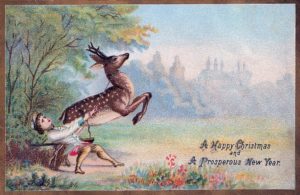Welcome to day 10 of our Cotton Famine Christmas Countdown! To get us in the festive (sort of) spirit, we’re featuring a seasonal Cotton Famine Poem every day in the run up to our special Christmas event with Jennifer Reid on 20th December. Free tickets for the event are available here: https://www.eventbrite.co.uk/e/the-twelve-cotton-famine-poems-of-christmas-tickets-52954230529
Today’s poem is by Edwin Waugh, probably the best known dialect poet of the period (though this poem is in standard English). It was published in the Bolton Chronicle on January 24th, 1863.
REMEMBER THE POOR.
BY EDWIN WAUGH.
As I sat by the fire on a bleak winter’s day,
When the woods and fields were forlorn;
When the waters were candied all over with ice,
And the keen blast wailed in the thorn;
Across by my window the thick falling snow,
As it drifted upon the wind.
Threw a cold-looking gloom o’er my warm little room
And awoke sad thoughts in my mind.
A small bird came begging to my window sill,
And the snow-drift powdered his breast;
He chirped and he peeped till I threw him some crumbs,
Which he took up aloft to his nest;
Then I shut down the window to keep out the wind,
And I paced o’er my parlour floor;
And I looked at the fire; and I said with a sigh,
“Now’s the time to remember the poor!”
Creeping dose to my hearth-stone, so cosy and warm,
Where the wild cold winds I defied.
I began to muse on the sick and forlorn,
And the poor folks that roam outside;
And, trembling to think what the thousands that
In their comfortless nooks endure,
I looked through the window again, and I said—
“Now’s the time to remember the poor!”
As yon pale workman creeps through the snow-muffled street,
‘Mid the white flakes whirling past,
His frost-bitten bands in his garments so thin
He is hiding away from the blast:
Now he halts by yon kitchen, whose savoury steams
Many a famishing wand’rer allure ;
Then he glides on again like a ghost, through the snow;—
“Now’s the time to remember the poor!”
And now, from a corner, that fends off the storm,
He peers, with despair in his eye,
At the fire-lighted windows the warm chimney-top,
And the coach rolling merrily by;
Once more, he goes murmuring slow on his way,
“Lord, how long will this endure?”
And the snow-shroud whirls wild round its shivering prey, —
“Now’s the time to remember the poor!”
How little they think, who are cheerful and warm,
While they laugh at the wintry tide,
What the folk that are hungry, the sick and the sad,
In their cold, dark corners abide :
But this life it is short, both to high and to low,
And there’s nought upon earth that’s sure :
We were bare when we came, and bare we most go,—
“Now’s the time to remember the poor!”
Commentary
Waugh’s poem does not specifically mention the Cotton Famine, but has relevance to the period due to the familiar themes of poverty and charity. As in many of the other Christmas poems, the comforts of a well-to-do home are contrasted with the “comfortless nooks” of the unfortunate poor. Waugh emphasises the impact of the cold, repeatedly referring to the snow, ice, and keen wind that compound the misery of a poorly dressed worker with little to spare for blankets or fuel. Waugh himself had working-class origins, though by the time of the Cotton Famine, he was able to make a living from his writing. This is from the point of view of someone comfortably off, rather than in the voice of the cold, hungry worker, and is perhaps therefore aimed at those who were able to “remember the poor” through charitable acts.
The version of this poem published in Waugh’s Poems and Songs (1889) notes that it is composed ‘To an old English melody’, and thus was intended to be sung rather than simply recited.
Dr Ruth Mather, University of Exeter.

A Victorian Christmas Card, from Nova Scotia Archives on flickr.com